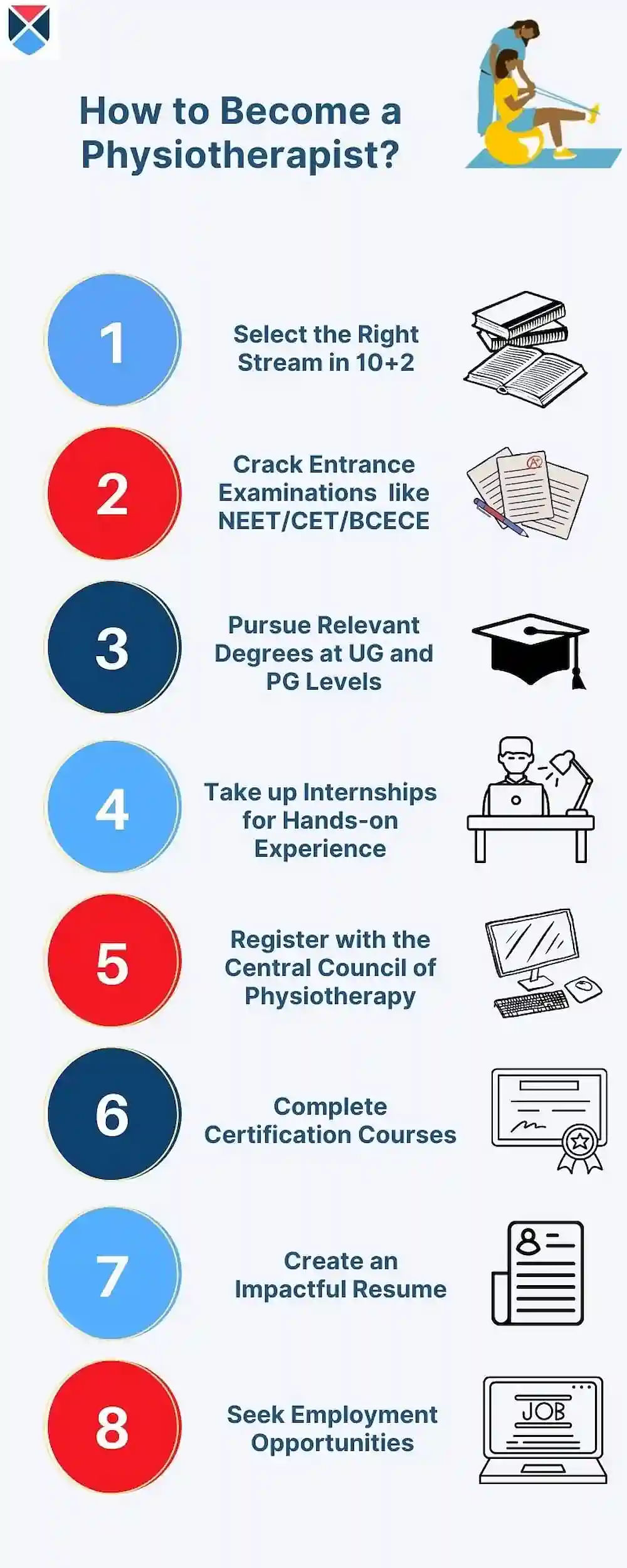Is being a Physiotherapist your dream career option? Check out the complete step by step process on how to become a Physiotherapist, Eligibility, Exams, Skills Required and Salary in 2023.
Physiotherapists are medical professionals who specialise in the treatment of physical conditions caused by illness, injury, ageing, or disability. Through manual therapy, exercise, massage, stretching, and other therapeutic procedures, physiotherapists help individuals restore mobility and functional abilities. A report by WHO indicates that for every 10,000 residents in India, there is only 1 physiotherapist. Therefore, considering India’s population, there are around 1.4 lakh physiotherapists in the country.
Candidates looking forward to becoming a physiotherapist should first complete 12th with Physics, Chemistry, and Biology as the core subjects & get at least 50% aggregate marks. The next educational requirement is completing a bachelor’s program like a Bachelor of Physiotherapy, B.Sc in Physiotherapy, etc. Moreover, to become a physiotherapist, aspirants must also complete a 6-month internship in a state-run or private hospital.
Table of Contents
- How to Become a Physiotherapist in India?
- Who is a Physiotherapist?
- What does a Physiotherapist do?
- Specialisation of Physiotherapists
- Eligibility Criteria to Become a Physiotherapist
- Skills and Qualities of a Physiotherapist
- Top Physiotherapy Colleges in India
- Physiotherapist Job Opportunities
- Physiotherapist Salary in India
- Top Companies in India that Recruit Physiotherapists
- Benefits and Drawbacks of Being a Physiotherapist
How to Become a Physiotherapist in India?
Any candidate who is aiming to become a physiotherapist must have the required physiotherapist qualifications. Here is a step-by-step guide on how to be a physiotherapist in India.
- Step 1: Select the Right Stream in 10+2
- Step 2: Crack Entrance Exams
- Step 3: Pursue Relevant Degrees
- Step 4: Get Internship Experience
- Step 5: Register with the Central Council of Physiotherapy
- Step 6: Complete Certification Courses
- Step 7: Create an Impactful Resume
- Step 8: Seek Employment Opportunities
Step 1: Select the Right Stream in 10+2
It is important to choose the right subjects in class 12 to become a physiotherapist. Aspirants should finish their senior secondary education in the Science stream. Furthermore, they should secure at least 50% of the total marks in 10+2.
Step 2: Crack Entrance Exams
Top colleges accept applications for physiotherapy courses at UG and PG levels through entrance exam scores. Moreover, NEET is not compulsory for admission to physiotherapy programs. Following are some of the top physiotherapy entrance exams for admission into bachelor’s and master’s physiotherapy courses:
|
UG Entrance Exams |
PG Entrance Exams |
|
NEET |
IPU CET |
|
IPU CET |
MET |
|
BCECE |
LPUNEST |
|
LPUNEST |
NEET PG |
|
IEMJEE |
AIAHCET |
Step 3: Pursue Relevant Degrees
Once students possess valid entrance test marks, they can apply to top physiotherapy colleges to get admission into bachelor’s physiotherapy courses. The table below shows the top bachelor’s courses to become a physiotherapist. Candidates can also check the physiotherapist course duration and fee details.
|
Course Name |
Duration |
Average Annual Fee (INR) |
|
Bachelor of Physiotherapy (BPT) |
4 years |
INR 1,00,000-5,00,000 |
|
B.Sc in Physiotherapy |
3 years |
INR 1,00,000-5,00,000 |
Candidates can pursue a master’s degree in physiotherapy after completing their graduation to acquire advanced knowledge in the subject. Here are the top physiotherapy courses that they can pursue at the postgraduate level.
|
Course Name |
Duration |
Average Annual Fee (INR) |
|
Master of Physiotherapy (MPT) |
2 years |
INR 90,000-5,00,000 |
|
M.Sc in Physiotherapy |
2 years |
INR 80,000-2,00,000 |
|
MPT Sports Physiotherapy |
2 years |
INR 40,000-2,00,000 |
Step 4: Get Internship Experience
After completing the education needed to become a physiotherapist, it is necessary for aspirants to gain practical experience and acquire relevant skills through internships. To become a physiotherapist, a candidate must undergo a 6-month internship in a private/state-run hospital after completion of the BPT course.
Step 5: Register with the Central Council of Physiotherapy
Candidates need to register with the Central Council of Physiotherapy to be able to work as a Physiotherapist in India. Candidates must visit the official website of the Council to register themselves online.
Step 6: Complete Certification Courses
Candidates can also pursue various certifications to widen their knowledge base in any subject or topic related to physiography. Taking up certifications is completely optional. Here are a few certification courses that might be useful for candidates in their physiotherapist careers.
- Physiotherapy Exercise and Physical Activity for Knee Osteoarthritis (PEAK)
- PDSAFE: Physiotherapy and Falls Prevention in Parkinson's
- Certified Physiotherapy Equipment Technician
Step 7: Create an Impactful Resume
Moving forward, aspirants should create a resume that stands out and grabs the attention of the recruiter. Make sure to add all the necessary qualifications, skills, and certifications that have been obtained so far. However, the resume should not be too lengthy.
Step 8: Seek Employment Opportunities
It is the time for candidates to explore job opportunities and begin their careers as a physiotherapist. Candidates can seek employment opportunities in clinics, nursing facilities, gyms, medical facilities, athletic training centres, rehab centres, special schools, hospitals, etc. It is also possible for aspirants to open their own clinic and work under the supervision of an experienced physiotherapist.
Who is a Physiotherapist?
A physiotherapist is a medical expert who diagnoses, evaluates and treats the physical ailments of patients. With their expertise in physiotherapy, these professionals assess the severity of injuries and develop treatment plans to aid patients’ recovery. As a physiotherapist, a candidate can help individuals live a better quality of life.
What does a Physiotherapist do?
Physiotherapists treat patients with issues like backache, pelvic problems, lung issues, asthma-related issues, sports injuries, and more. The role of physiotherapists in hospitals is to work closely with various medical experts to devise treatment methods for patients. The following are the key physiotherapist roles and responsibilities:
- Diagnosing, measuring, and treating the physical ailments of patients
- Working with patients to restore their movement problems and reduce their pain
- Keeping a record of the health of the client
- Monitoring the patients’ progress after they are discharged from the hospital
- Curating personalised fitness plans for clients and promoting a healthy lifestyle
- Creating treatment methods to improve mobility, minimise severe pain, and restore functioning.
Specialisation of Physiotherapists
Now that students know the physiotherapist role let us learn about the different types of physiotherapists in India.
1. Musculoskeletal physiotherapist
Such physiotherapists deal with problems like strains, back pain, sprains, and posture issues. They focus on improving muscle strength and flexibility.
2. Cardiorespiratory physiotherapists
They aim to improve issues like chronic bronchitis, asthma and any other cardio-respiratory problems. They assess patients’ requirements and accordingly provide efficient physiotherapy cardio-respiratory services.
3. Neurological physiotherapist
This kind of physiotherapist works on treating disorders that impact the nervous system. Such conditions include Parkinson’s strokes and brain injuries.
4. Geriatric physiotherapists
They help older adults maintain physical health by focusing on their movement requirements as they age. Geriatric physiotherapists work on treating issues like osteoporosis, arthritis, joint discomfort, and Alzheimer’s disease.
5. Pediatric physiotherapists
Their job is to diagnose and treat children, infants, and teenagers who have neuromuscular, developmental, and congenital disorders. They also look into other conditions like cerebral palsy, autism, developmental delays, and autism.
6. Women's health specialist
The physiotherapist deals with issues concerning the female reproductive system, childbirth, and prenatal and postnatal care.
7. Sports physiotherapists
Their expertise lies in providing treatment for sports-related injuries or conditions that prevent individuals from taking part in sports activities.
Qualifications Required to Become a Physiotherapist
To pursue a career as a physiotherapist, it is crucial for aspiring candidates to comply with certain requirements. The eligibility for physiotherapists has been explained below.
- A candidate should complete his/her 12th standard from a recognised board. The minimum aggregate mark requirement is 50%. Moreover, the main subjects in 10+2 must be biology, physics, & chemistry.
- Entrance exams like NEET, CET, BCECE, IPU CET, etc., must be cleared to secure admission into the best physiotherapy institutes in India.
- An undergraduate degree in physiotherapy, like BPT, B.Sc in Physiotherapy, etc., must be pursued by candidates.
- One can also pursue a master’s degree in physiotherapy. As the basic requirement, candidates must hold a bachelor’s degree in the relevant discipline.
Skills and Qualities of a Physiotherapist
A specific set of soft and technical skills is needed in order to excel in the field of physiography. Candidates with relevant skills land well-paying physiotherapist jobs. Take a look at the major physiotherapist skills below:
- Motor skills
- Stress Management
- People Skills
- Communication skills
- Science acumen
- IT skills
- Physical fitness
- Clinical Reasoning
- Sensitivity and empathy
- Problem-solving skills
Top Physiotherapy Colleges in India
Over 200 colleges in India offer physiotherapy courses. Below are the top physiography colleges in India based on NIRF ranking 2023.
|
Name of College |
NIRF Ranking 2023 |
|
PGIMER Chandigarh |
2 |
|
Christian Medical College, Vellore |
3 |
|
SGPGIMS Lucknow |
7 |
|
Kasturba Medical College, Manipal |
10 |
|
Madras Medical College, Chennai |
12 |
|
Dr DY Patil Vidyapeeth, Pune |
17 |
|
SRM Institute of Science and Technology, Chennai |
20 |
|
DMIHER Wardha |
24 |
|
Saveetha Institute of Medical and Technical Sciences, Chennai |
25 |
|
Kasturba Medical College, Mangalore |
31 |
|
Jamia Hamdard University, New Delhi |
33 |
|
Christian Medical College, Ludhiana |
36 |
|
MS Ramaiah Medical College, Bangalore |
38 |
|
Krishna Institute of Medical Sciences, Karad |
42 |
|
DY Patil University, Navi Mumbai |
45 |
Physiotherapist Job Opportunities
There are many job opportunities available for physiotherapists beyond the hospital setting. Physiotherapists must choose a work environment that aligns with their professional goals and interests. As a physiotherapist, candidates can find employment opportunities in the following organisations or places.
- Corporate Firms: There are many physiotherapist jobs in MNC companies. Corporate organisations recruit physiotherapists to ensure the physical well-being of their employees. Physiotherapists also help employees prevent injuries in the workplace.
- Private clinics: Physiotherapists can work independently by taking up private practice or working in outpatient clinics. Here they can provide one-on-one treatment to patients who are suffering from different neurological, cardiopulmonary, or musculoskeletal disorders.
- Sports Facilities: Many sports organisations and fitness centres hire physiotherapists to assist athletes in recovering from injuries and improving their performance & overall physical fitness.
- Military Establishments: At military establishments, a physiotherapist works on curing and preventing injuries of soldiers and other military personnel. Candidates can appear for the CDS exam for physiotherapists administered by UPSC to work as a physiotherapist in the defence sector.
- Home healthcare: Many physiotherapists offer services to clients in their homes, especially elderly patients who might face challenges in visiting nursing homes.
- Rehabilitation Centres: At rehabilitation centres, physiotherapists work with patients recovering from accidents, illnesses, or surgeries & help them restore strength and mobility.
- Schools and Universities: As a trainer at schools/universities, physiotherapists educate students about following a healthy lifestyle. Further, they deal with students having disabilities or injuries.
Physiotherapist Salary in India
In India, the physiotherapist's salary per month is around INR 26,903. With more experience and knowledge, physiotherapists can earn lucrative pay packages. Let us find out more about the experience-wise average salary of physiotherapists in India.
|
Level |
Experience |
Average Annual Salary (INR) |
|
Entry-Level Physiotherapist |
Less than 1 year |
2,92,986 |
|
Early Career Physiotherapist |
1-4 years |
INR 3,06,168 |
|
Mid Career Physiotherapist |
5-9 years |
INR 4,11,209 |
|
Experienced Physiotherapist |
10-19 years |
INR 4,98,637 |
|
Late Career |
20+ years |
INR 6,00,000 |
According to the job profile of a physiotherapist, he/she can earn the below-mentioned salary packages on average.
|
Job Profile |
Annual Average Salary (INR) |
|
Osteopath |
3,89,000 |
|
Sports Psychologists |
5,50,000 |
|
Defence Medical Establishment |
3,50,000 |
|
Lecturer |
5,05,000 |
|
Sports Physio Rehabilitator |
5,00,000 |
|
Freelance Physiotherapist |
8,70,000 |
Top Companies in India that Recruit Physiotherapists
Over 100 companies recruit physiotherapists across the country. Listed below are the leading companies that hire physiotherapists in India.
- Defence Ministry of India
- First Physio Clinic
- Fortis Healthcare Company
- Spectrum Physio Centre
- Pain-Free Physiotherapy Clinic
- Apollo Hospital
- Sarthak Health Care
- DRS Physio & Wellness
Benefits and Drawbacks of Being a Physiotherapist
Aspiring physiotherapists should bear in mind both the benefits and drawbacks of this profession before starting their career journey.
Benefits of Becoming a Physiotherapist
Check out the physiotherapist job benefits through the factors mentioned below.
- High Salary: Physiotherapists are well paid in comparison to other healthcare professionals. The starting salary of a physiotherapist, on average, is INR 3,22,832.
- Stable career: With the change in lifestyle and health conditions of individuals, the demand for physiotherapists has increased over the years. Therefore, there is stability in this career.
- Job satisfaction: Physiotherapists experience immense satisfaction as they are able to help people lead a better quality of life.
- Flexibility: Since one can practice privately as a physiotherapist, there is flexibility in working hours which is another advantage of taking up this profession.
- Work-life balance: There are no set hours of work for a physiotherapist. Hence, they are able to manage a work-life balance.
Drawbacks of Becoming a Physiotherapist
Here are some challenges that candidates might face as a physiotherapist.
- Patience: A lot of patience is needed by physiotherapists to work with various kinds of patients. It might be challenging to work with some patients based on their conditions.
- Attentiveness: As physiotherapists, candidates must be very attentive while treating patients who have multiple or sensitive conditions.
- Physically demanding: The work of a physiotherapist can be physically demanding, and they need to be fit and healthy themselves.













POST YOUR COMMENT